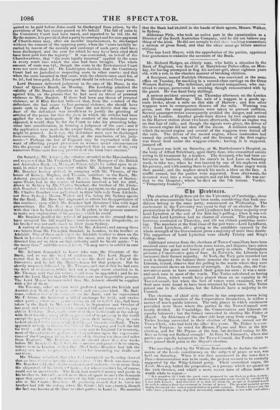Zbe Vrobintes.
The election of High Steward for the University of Cambridge, about which an unaccountable fuss has been made, considering that both can- didates belong to the same party, commenced on Wednesday. The excitement in the University was equal to that of an election for Re,. presentatives in Parliament. Lord Lyndhurst had a large majority over Lord Lyttelton at the end of the first day's polling ; when it was evi- dent that Lord Lyttelton had no chance of success. The polling was, however, continued on Thursday, and till ten o'clock yesterday morn- ing. The numbers at the final close of the poll were—Lord Lyndhurst, 973; Lord Lyttelton, 487 ; giving to the candidate opposed by the whole strength of the Government press a majority of more than double. The supporters of Lord Lyttelton were chiefly Trinity and King's College men.
Additional returns from the elections of Town-Councillors have been received since our last notice from some towns, and disputes have arisen respecting the gains and losses of each party in others. Nottinghant presents a Conservative gain of four. In Norwich, the Liberals have increased their former majority. At York, the Tory gain recorded last week is disputed; the balance there remains the same as it was : the Liberals, indeed, observe that the polling in the wards where they were not successful shows an increase of strength. At Leeds, also, the Con- servatives seent to have counted their gains too soon : it was a neck- and-neck race in most of the wards. The Tories calculated on having gained three, which would have placed them on an equality in the Town-Council; but when the lists of voters were examined, two of their men were found to have been returned by bad votes. The Tories gained one in the elections, but the Liberals have a majority in the Council.
The elections of chief civic officers in the corporate towns being decided by the members of the Corporations themselves, is seldom a matter of lintel, public interest. The only places in which excitement prevailed were those where the parties in the Town-Council were nearly divided. At Cambridge, the Conservatives and Liberals are equally balanced ; but the former succeeded in electing Mr. Fisher as Mayor. An Alderman of the other side kept away from voting. The Tories having succeeded in their election of Mayor, turned out the Town-Clerk, who had held the office five years. Mr. Fisher is a con- vert to Toryism he voted fur Messrs. Pryme and Rice at the first election, and for Mr. Prynte at the last, hut declined voting for Mr. Bice as being mit Radical enoughI At Bury St. Edmund's, where also parties are equally balanced in the Town-Council, the Tories claim to have gained their point in the Mayor's election.


























 Previous page
Previous page